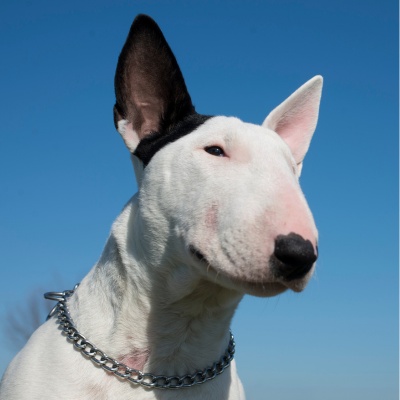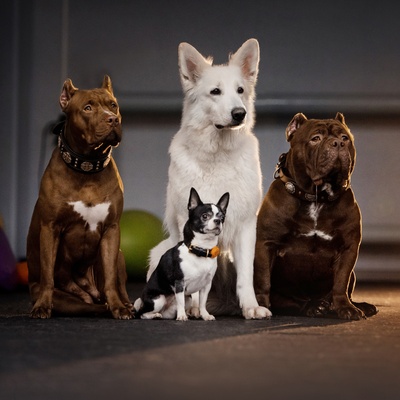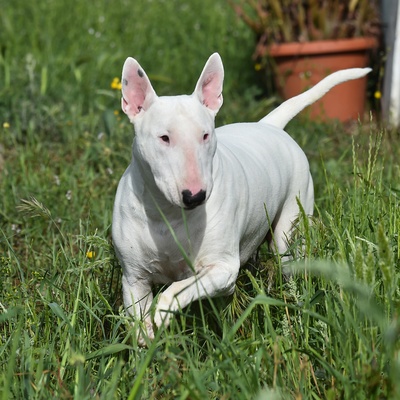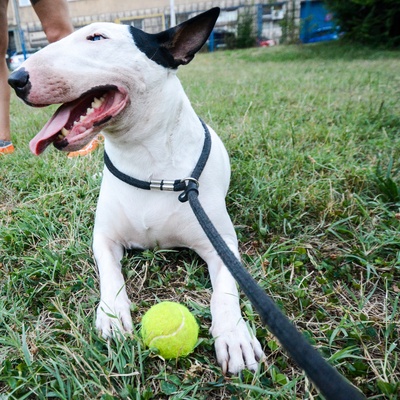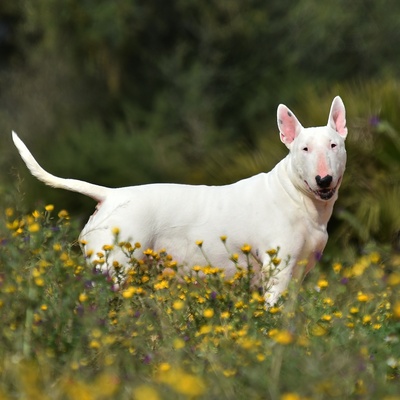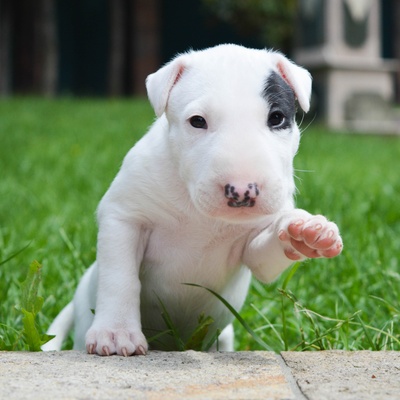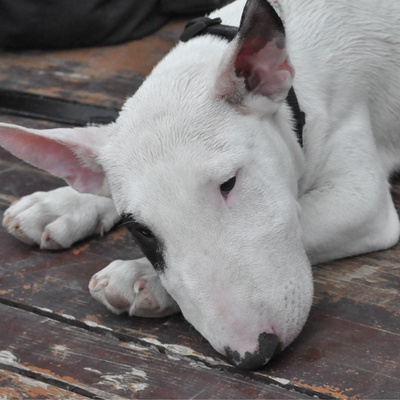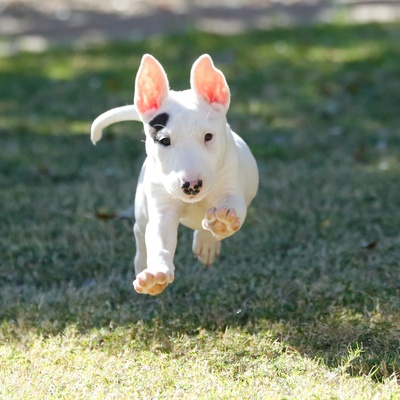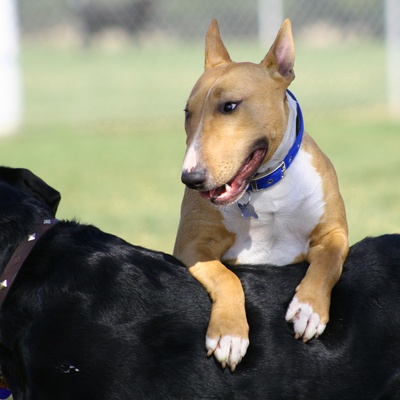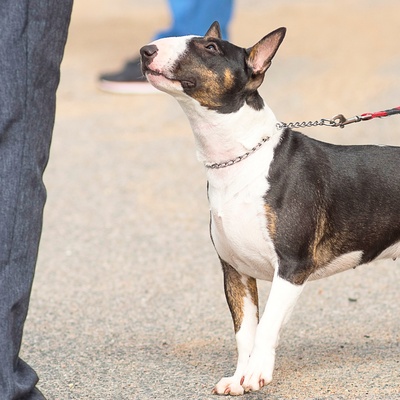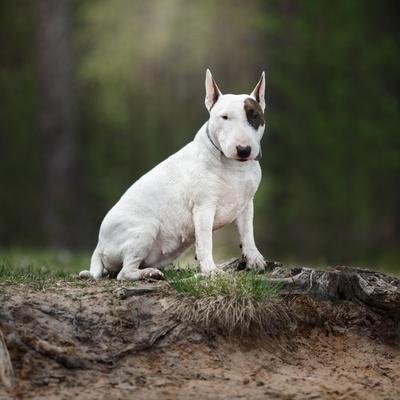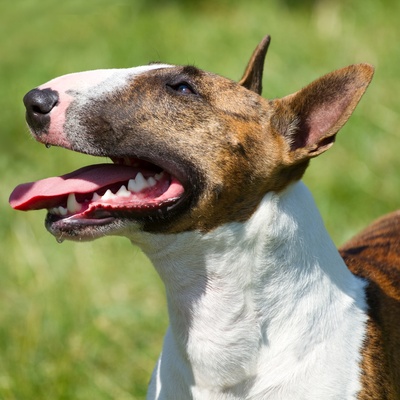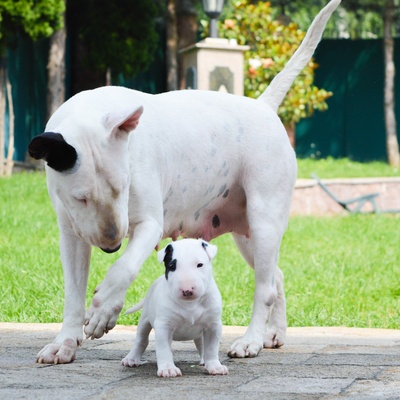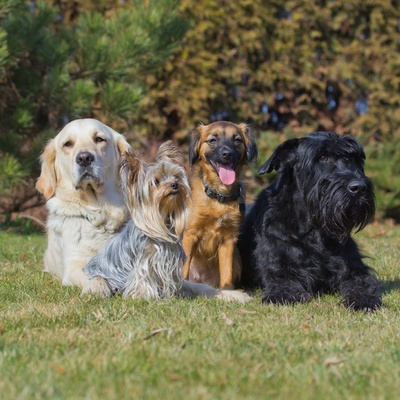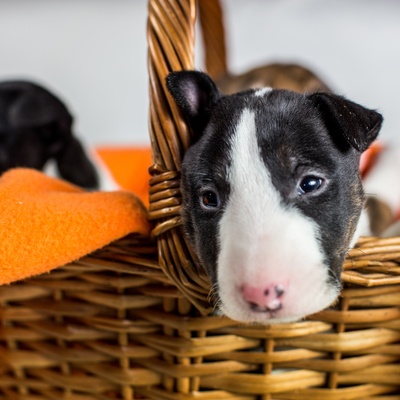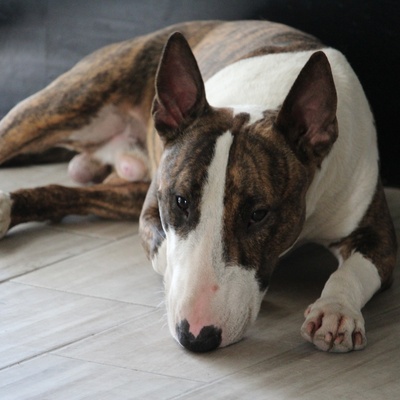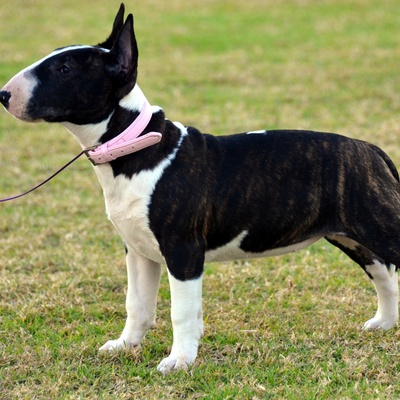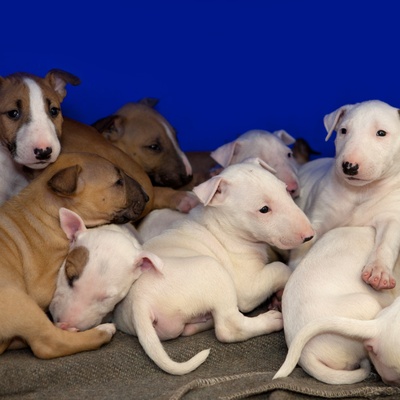Introducing the Bull Terrier
Discover all there is to know about the Bull Terrier: its characteristics, behavior, training, and its cost.
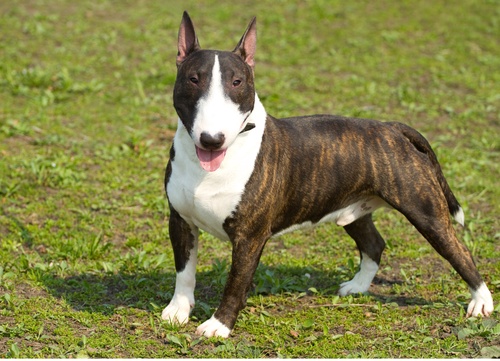
Discover all there is to know about the Bull Terrier: its characteristics, behavior, training, and its cost.
The Bull Terrier, known for its unique egg-shaped head and strong build, originated in 19th century England from crossing Bulldogs with the extinct White English Terrier. Initially bred for dog fighting, they've become notable for their muscular frame and global recognition. Beyond their strength, Bull Terriers are cherished for their friendly and loving nature. They adapt well to various roles, including loyal pets, sports participants, and therapy dogs, thanks to their sociable demeanor and affectionate bond with families, making them excellent companions for those who value their distinctive traits.
This section outlines the unique features of the Bull Terrier breed.
The Bull Terrier, part of the energetic and fearless terrier group, is bred for hunting and pest control, standing out for its courage and unique character.
Bull Terriers are robust and muscular dogs. The standard Bull Terrier stands at about 21 to 22 inches at the withers and typically weighs between 50 to 70 pounds.
Bull Terriers possess a short, flat coat that is easy to groom. The coat is dense, providing a good level of protection against weather elements.
Bull Terriers can sport a variety of coat colors. They are commonly found in white, but can also have black, brindle, fawn, red, or tricolor markings, often with distinct and striking patterns.
Bull Terriers adapt well to various living environments, thriving in both apartments and houses. However, they require adequate space for exercise to channel their high energy levels.
Bull Terriers are known for their friendly and affectionate demeanor. They are generally good with children and can be sociable with other animals if properly trained and socialized from a young age.
Generally, Bull Terriers are a healthy breed, but they can be predisposed to certain conditions like heart problems and deafness, especially in white Bull Terriers. Regular health checks are recommended.
Bull Terriers, intelligent but stubborn, need consistent, patient training with positive reinforcement and early socialization to become well-rounded.
We can help!
Every dog has its own character, and so do you. Making the right choice will ensure his well-being and yours.
Take our quiz to find out which breed is right for you, based on your personality, lifestyle, location and many other criteria.
Don't wait any longer and take the quiz to find out the answer!
Bull Terriers are medium-sized dogs known for their distinctive egg-shaped head and muscular physique. Their smooth, short coat, often white or variably colored, and their unique, curved face make them stand out in the canine world.
Bull Terriers are robust and compact. Females typically stand between 21 and 22 inches, while males can reach up to 22 inches. In terms of weight, females usually weigh around 50 to 60 pounds, and males can weigh between 55 and 70 pounds.
Bull Terrier puppies grow at a steady pace, reaching their full size relatively quickly. By around 6 months, they show significant growth and generally reach their adult height and weight by the age of 12 to 18 months. Their growth, while swift, is proportional, ensuring they maintain their unique and balanced physical appearance throughout their development stages.
Bull Terriers have a distinctively short, flat coat that's sleek to the touch. This type of coat is known for its practicality, being both smooth and easy to care for. The texture is uniformly sleek across their body, lacking the longer fringes or waves seen in other breeds.
The Bull Terrier's coat showcases a vibrant range of colors. While many are familiar with the iconic white Bull Terrier, they can also exhibit other colors such as black, brindle, red, fawn, and tri-color. Each coloration brings its unique aesthetic, making each Bull Terrier distinct in appearance.
The coat of a Bull Terrier is notably low-maintenance. Their short fur doesn't require extensive grooming; however, they do shed year-round, with some increased shedding during seasonal changes. Regular brushing, about once a week, is sufficient to keep their coat in good condition and reduce shedding around the home. Bull Terriers are generally clean dogs with a coat that doesn’t trap odors easily, so frequent bathing is unnecessary.
A bath every few months or when particularly dirty should suffice, always considering their skin sensitivity. This straightforward grooming routine makes them an ideal choice for those who admire a dog’s companionship but seek a breed that isn’t demanding in terms of coat maintenance.
The Bull Terrier presents a unique and striking silhouette, often described as balanced and well-proportioned despite its robust build. The most distinctive feature of this breed is its head, which is oval-shaped and almost flat at the top, giving them an immediately recognizable profile. The Bull Terrier's eyes are small, deep-set, and triangular, typically dark in color, contributing to their keen and alert expression. Their ears are small, thin, and close together, sitting erect on top of the head, which adds to their attentive and interested appearance.
The body of a Bull Terrier is characterized by a strong, muscular build with a broad chest and a short, strong back. This build reflects their agility and strength, traits essential to the breed's historical roles but also making them excellent companions for active lifestyles. Their tail is short and carried horizontally, complementing their distinctive overall appearance.
The Bull Terrier is known for its bold, affectionate, and playful temperament. These dogs are fiercely loyal, making them excellent companions for their families.
There are over 400 dog breeds categorized into 10 distinct groups. Each group shares common features and serves specific roles.
The Bull Terrier falls under the terrier group, which includes breeds like the Scottish Terrier, Airedale Terrier, and Staffordshire Bull Terrier. Terriers are traditionally bred for hunting and vermin control, traits that are evident in their energetic and tenacious personalities. Despite their small to medium size, dogs in this category are known for their courage and determination.
Bull Terriers, in particular, display a unique combination of boldness and gentleness. They possess a developed instinct and intelligence that make them both playful and protective. Initially bred for dog fighting, Bull Terriers have evolved to become loyal and affectionate family pets. Their primary role today is as a companion, offering an incomparable blend of bravery, loyalty, and playfulness, making them well-suited for active and attentive owners who appreciate their unique characteristics and spirited nature.
Bull Terriers are known for their vibrant and engaging personality, displaying a wonderful blend of playfulness and loyalty. These dogs are incredibly affectionate and form deep bonds with their owners. They thrive in an environment where they receive ample attention and interaction.
Bull Terriers have a robust personality, requiring an owner who can be present and attentive, guiding their development with a firm but loving hand. Their independent nature is coupled with a strong desire for companionship, making them well-suited for families that can provide both love and structure.
Bull Terriers are sociable dogs known for their generous spirit and friendly demeanor. They generally get along well with humans, including being good companions for children, thanks to their playful and protective nature. However, like all breeds, early socialization is crucial for them to develop good habits and comfortable interactions with other people and pets.
Their strong build and energetic temperament mean they can be boisterous, so supervision around young children is always advised. Ensuring they are socialized from a young age helps to harness their natural sociability and ensure they grow into well-adjusted, friendly adults. Proper training and socialization are key to developing a Bull Terrier's natural affinity for companionship and play.
Bull Terriers are remarkably adaptable and can thrive in various living environments, be it a spacious house or a cozy apartment, in bustling urban areas or tranquil rural settings. However, the key to their happiness lies not in the space itself but in the attention and engagement they receive from their owners.
These dogs crave interaction and can become unhappy if left alone for extended periods. As for exercise, Bull Terriers require regular, structured walks – at least two per day, each lasting around 30 to 45 minutes – to help them expend energy and maintain their physical and mental health.
While Bull Terriers can adapt to living indoors, they truly flourish when they have access to an outdoor environment. This breed is known for its curiosity and energy, and having a secure outdoor space allows them to explore, play, and satisfy their natural instincts. A backyard or nearby park where they can run freely and engage in stimulating activities is ideal.
Remember, Bull Terriers have a strong prey drive, so any outdoor area must be securely fenced to prevent them from chasing after small animals. Providing them with ample opportunities for outdoor adventures will keep them physically fit and mentally stimulated, ensuring a happy and balanced canine companion.
Training a Bull Terrier can be a unique experience, as this breed combines superior intelligence with a notably stubborn streak. These dogs are quick learners and can master commands easily, but they require training methods that are consistent and engaging.
Positive reinforcement, along with patience and understanding, works best. Due to their independent nature, Bull Terriers might sometimes choose to ignore commands, especially if they find them uninteresting or pointless. To mitigate their tendency to wander, especially when off-leash, equipping them with a GPS collar is a wise precaution. This helps ensure their safety and gives owners peace of mind during outdoor adventures.
When it comes to listening and responding to commands, Bull Terriers can excel, provided they respect their trainer. These dogs are eager to please but require a firm, consistent hand in training. Their unique personality calls for a balanced approach – one that combines authority with affection.
Training should start early to instill good habits and social skills. Their playfulness can be leveraged to make training sessions more enjoyable and effective. Although they have a strong personality, with the right approach, Bull Terriers can be well-mannered and obedient companions, reflecting the time and effort invested in their training.
Take the test and find out the dog breed that matches your personality and lifestyle.
The Bull Terrier is generally a healthy and robust breed, but like all dogs, requires attentive daily care to maintain its health and prevent diseases. Regular health check-ups and preventive measures can significantly contribute to a Bull Terrier's long and happy life.
Bull Terriers are typically known for their good overall health and resilience. However, they do have some predispositions to specific health issues. Skin conditions like allergies and zinc deficiency-related issues can occur. Additionally, they are prone to certain hereditary conditions, such as heart problems and kidney disease. Bull Terriers might also experience patellar luxation and deafness, particularly in white Bull Terriers.
It's essential to watch for symptoms like lethargy, loss of appetite, or unusual behavior, which might indicate health issues. On average, a Bull Terrier's lifespan ranges from 11 to 14 years.
Ensuring regular veterinary care throughout a Bull Terrier's life is crucial. This includes keeping up with vaccinations, deworming schedules, and timely parasite control treatments. Daily care practices should include regular brushing of their short coat, cleaning their ears to prevent infections, and maintaining dental hygiene through brushing and dental treats. Their nails should be trimmed regularly to prevent discomfort and walking issues.
Be aware of potential allergies in Bull Terriers, and consult a vet for appropriate dietary and environmental adjustments. Bull Terriers are not considered hypoallergenic, so they may not be the best choice for people with severe dog allergies.
It's crucial to provide Bull Terriers with a diet that meets their specific nutritional needs. A balanced diet, rich in proteins and vitamins, is essential for their health and vitality. High-quality kibble designed for Bull Terriers is recommended as it offers a comprehensive nutritional foundation.
For more active dogs, supplementing their diet with lean meats can provide extra protein, but remember to monitor fat intake to maintain their health and weight. Regular meal times and portion control are important to prevent overfeeding.
The Bull Terrier is a well-regarded breed known for its unique appearance and strong personality. There are several reputable breeders available, but it's important to consider several factors before adopting a Bull Terrier to ensure it's the right fit for your lifestyle and environment.
Choosing a Bull Terrier involves several critical considerations. It's important to select a reputable breeder. Visiting the breeder's premises allows you to assess the living conditions and behavior of the dogs, ensuring a healthy and happy upbringing. Check the health of the puppy and its parents, seeking transparent information about any hereditary illnesses.
Additionally, it's a legal requirement in Great Britain to have your dog microchipped by 8 weeks old and registered on a database like Petlog or Animal Tracker. Non-compliance can result in a £500 fine. Microchipping can be done by your vet for a small fee or for free at any Blue Cross center.
The cost of a Bull Terrier varies based on factors like lineage, pedigree, breeder reputation, and the dog's age. Prices for Bull Terrier puppies can range from
to
. Keep in mind, owning a Bull Terrier involves ongoing costs for their care, including veterinary fees, food, and other necessities.
The annual expense of maintaining a Bull Terrier is estimated to be around
to
, depending on various factors such as health and lifestyle needs. When considering a Bull Terrier, it's essential to account for both the initial purchase price and the long-term care costs to ensure you can provide a loving and stable home for your new companion.
Choosing a dog that matches your personality and lifestyle will ensure your well-being and his!
